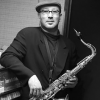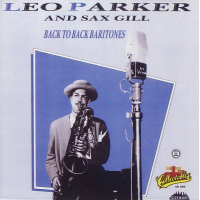Home » Jazz Musicians » Leo Parker
Leo Parker
Leo Parker was the proud owner of a big, beefy baritone sax tone and a fluent technique that struck a great match between the gritty, down-home feeling of R&B and the advanced harmonies of bebop.
At first, he studied alto in high school, even recording with Coleman Hawkins' early bebop band at age 18 on that instrument in 1944. Parker was very active during the 1940s in several bebop bands, like the Billy Eckstine Band, breeding ground for a lot of upcoming jazz musicians. When Billy needed a baritone saxophone player in his band, he gave one to Leo Parker, nicknamed The Kid, who played the alto sax up to that time. Another story says that he took up the baritone to be not mixed up with his namesake Charlie Parker seems to be far-fetched. He became an excellent baritone player in the bands of Dizzy Gillespie and Sir Charles Thompson and combined fine bebop elements with rhythm and blues licks.
He worked with Dizzy Gillespie's band on 52nd Street in 1946 and Illinois Jacquet's group in 1947-1948, and recorded with Fats Navarro, J.J. Johnson, Dexter Gordon, and Sir Charles Thompson; he scored a hit with Thompson, "Mad Lad," on the Apollo label. In 1954 it stopped. Leo Parker withdrawed from the jazz scene, as is said due to lung problems, but his narcotics seem to be more likely. But it was no retirement for ever - in 1961 he came back with two great Blue Note albums. The first one, recorded September 1961 is his well known album "Let Me Tell You 'Bout It"; the second one was recorded a month later, but not released before 1986 as "Leo Parker Rollin' With Leo," although it seems that the cover had been finished already. The mono version (Blue Note normally made two version in this period) was never issued and several tunes made during this session were rejected. Four of them are to be found on 45rpm records.
The members of his sextet are all rather unknown and obscure musicians: Bill Swindell on the tenor saxophone, Dave Burns on trumpet, Johnny Acea on piano, Stan Conover on bass and Purnell Rice on drums. In the second recording session one week later, Al Lucas replaces the bass player and Wilbert Hogan is the new drummer man. This record is labeled as one of Leo Parker's best and, to be honest, I fully agree. It is great to listen to this skilled baritone player, who, to quote Dexter Gordon: This Kid could play, lots of bottoms. Leo Parker, or Mad Lad as he was also mentioned, passed away four month later, when he was already working on his third Blue Note album in February 1962. He got a fatal heart attack in New York City on the 11th of February 1962 now 46 years ago.
Read moreTags
Rollin' With Leo

by Richard J Salvucci
Leo Parker may not be a name that instantly springs to mind in the world of late 1940s bebop. There was one point, in 1948, however, when serious people, like Barry Ulanov, regarded Parker as the best baritone saxophonist around--in company with Charlie Parker and Fats Navarro. That is fancy company, so it is worth asking why he is so little remembered today? Parker was a contemporary of the now better known (or at least remembered) ...
Continue ReadingVarious Artists: The Birth of Bop

by Richard J Salvucci
Someone famously called jazz the sound of surprise, but all too often, what is on offer is the dull hum of routine. Or something like that. This historic reissue is, however, anything but routine. This is not the first time that Teddy Reig's Savoy sides have been reissued (was he also the mysterious Buck Ram listed as producing one track?), but Craft Recordings took a lot of trouble to produce this very fine selection. If a listener were, ...
Continue ReadingLeo Parker: Rollin' With Leo – 1961

by Marc Davis
What if I told you there's a saxman who was there at the birth of bebop--literally, he played on the very first bebop recording--and you've never heard of him? And what if I told you his life story is the very archetype of the tragic, drug-addicted jazz musician? Would you still want to hear his music? Listen anyway. Rollin' With Leo by baritone saxman Leo Parker is an obscure pleasure. Lately, I've been listening to it ...
Continue ReadingLeo Parker: Let Me Tell You 'Bout It

by Chris May
An uncomplicated, booting, bass-register driven melange of first generation bop and early R&B, Let Me Tell You 'Bout It is baritone saxophonist Leo Parker's finest surviving work, and it's measurably enhanced in this edition by Rudy Van Gelder's 2004 remastering.
Parker came up through the swing/jump band nexus--his most regular employer during the '40s was Illinois Jacquet--but frequently crossed over into more or less pure bop during the latter part of the decade, working with Tadd Dameron, J.J. Johnson, Fats ...
Continue ReadingLeo Parker: Savoy, 1947

Source:
JazzWax by Marc Myers
Leo Parker is one of the most under-recorded and under-appreciated baritone saxophonists of the bebop era. Like many jazz musicians in the late 1940s and early '50s, Parker succumbed to drug addiction and recorded far too little as a leader. He probably was more suited to be a sideman, leaving the responsibilities of contracting players, writing songs, arranging and holding rehearsals to others. A clear example of Parker's brilliance was his first leadership session for Savoy Records in October 1947. ...
read more
Bill Jennings and Leo Parker

Source:
JazzWax by Marc Myers
In the early 1950s, before modern jazz giants emerged with the rise of the 12-inch LP and the prestigious signing of Miles Davis to Columbia Records, R&B was all the rage. Independent radio saw to that, since many small stations in African-American communities played R&B records. They attracted larger listening audiences than jazz singles. Back then, R&B was largely for adults, since many of those singles were geared for jukeboxes in bars and clubs. African-American and white teens found the ...
read more




































